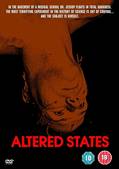| "Ever since we dispensed with God we've got nothing but ourselves to explain this meaningless horror of life. Well I think that true self, that original self, that first self is a real, mensurate, quantifiable thing, tangible and incarnate. And I'm going to find the fucker." | |
| Professor Eddie Jessup |
What is it, exactly, that constitutes a cinematic mindfuck? It's a subjective call, but if I leave the cinema with my head in a spin and a feeling of confusion about my location or – in extreme cases – my state of being, then I figure my brain has been satisfactorily messed with. It's somewhat inevitable that the majority of films that achieve this effect lie within the avant garde and outside the sphere of commercial cinema. These are films that do not necessarily make sense in terms of narrative and character, but which nonetheless leave you reeling. They are works to be experienced, film as art but with emotional and/or intellectual wallop. They are challenging, experimental, daring and exciting. They are the mindfucks.
The short film format is the natural home for such cinema – affordable for the creators and free from the narrative expectations that an audience inevitably bring to feature-length works. Check out the 'cut-up' films of William Burrows and Anthony Balch (The Cut-Ups, Towers Open Fire), the early films of David Lynch (The Alphabet, The Grandmother), or go back a few years and expose yourself to René Clair's Dadaist Entr'acte (1924) or Luis Buñuel and Salvador Dali's Un Chien Andalou (1929). The animated short in particular has proved a vibrant to the experimental artist looking to shove a blender in your brain – try Andrew McEwan's Toxic, Clive Whalley's And Now You, Zbigniew Rybczynski's Tango or just about anything you care to name by The Brothers Quay. Oooo, I get all shuddery just thinking about them. Let's not forget the music video, which can on occasion be far more than just a decorative MTV sales pitch – Chris Cunningham's downright disturbing interpretation of The Aphex Twin's Come To Daddy is a good place to start. If you're up to it, there is even the odd feature length brain blast – try taking on E. Elias Merhige's 1991 Begotten or Bill Morrison's extraordinary Decasia.
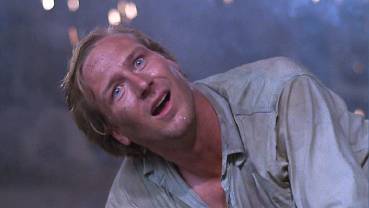
Just occasionally the experimental collides with the commercial feature with sometimes startling results. Witness Donald Cammell and Nicholas Roeg's astonishing Performance, Stanley Kubrick's 2001: A Space Odyssey, David Lynch's Lost Highway, Darren Aronovsky's Requiem for a Dream, Shane Carruth's Primer and even David Cronenberg's Videodrome.
And then there's Ken Russell, or 'Our Ken' as Alan Parker once affectionately described him. Russell's entire career is a testament to flamboyant, eccentric and, yes, experimental film-making. He has repeatedly taken chances that have resulted in accusations of of camp excess, but has nonetheless produced work that is on occasion touched with genius. The critical consensus has Women in Love as his finest feature, but it is also in many ways his most restrained, which is of course just why it is so critically popular. But for fans of outsider cinema it remains a solid early work in the career of a man who went on to give us Mahler, The Music Lovers, The Boy Friend, Tommy and, joy of joys, The Devils, a marvellous slice of cinema that is desperately in need of a special edition DVD release.
But between 1980 and 1984 something completely unexpected happened to Russell – he went to Hollywood to make two commercial features for American studios. This wasn't his first flirt with Tinseltown, of course, as in 1967 he made the third Harry Palmer film Billion Dollar Brain for United Artists, but there he was more a director for hire – this time around he was to be paired with films that seemed perfectly suited to his skills and sensibilities. The second was to be the sexually twisted Crimes of Passion. The first was Altered States. And it's fucking marvellous.
My first exposure to Altered States was in the form of a review written for UK based fantasy film magazine Starburst back in 1981 by the venerable John Brosnan, who was reeling from the idea that Ken Russell, of all people, had made what he was certain would come to be regarded as a science fiction movie classic. Although he believed a great film should play as well in any format, he (in an unrelated article that I can't for the life of me find now) enthusiastically advised the magazine's readers to see this one in the front row of the largest cinema they could find, where the screen was huge and the Dolby sound at its most deafening. I dutifully made my way to London and the ABC in Shaftsbury Avenue, one of my favourite venues at the time. I bought my front row seat and for 102 minutes exposed myself to Russell's audio-visual assault on both the senses and the intellect. When I emerged from the cinema I was literally shaking, and I continued to buzz as I walked down Tottenham Court Road towards any pub with an uncluttered route to the bar, only vaguely aware that I was still in London at all. I was left in no doubt – Ken Russell had not only made an electrifying genre film, he had created one of the finest mindfucks ever to emerge from the world of commercial cinema.
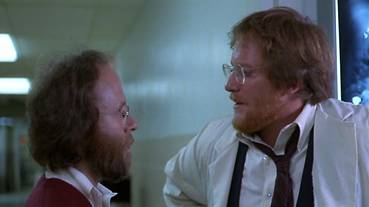
Based on the novel by Paddy Chayefsky, the screenplay is credited to one Sidney Aaron, which for those in the know is a signal of production problems. Our Sidney has not done that many films, certainly not as many as his more famed cousin Alan Smithee. If this means nothing to you then I should point out that these are both pseudonyms for contributors so pissed off with a production, for whatever reason, that they no longer want their name to appear on the credits. Such was the case with Chayefsky and his relationship with Russell. I'm sorry to say that to this day I have never read Chayefsky's novel, so I am in no position to comment on the how the changes made by Russell affected the story (although Brosnan testified to how faithful the film is and was equally bemused by the bust-up), but I can state with some confidence that there is nothing in Russell's final version that cries out for a re-write or feels out of place. Whatever happened between the two,* Chayefsky the writer and Russell the director absolutely nailed the movie version. And how.
The film begins with the story already under way. Eddie Jessup, a young but gifted research scientist, is floating in a sensory deprivation tank, his condition monitored and recorded by his colleague and friend Arthur Rosenberg. Jessup has been using the tank to test subjects as part of his work on schizophrenia and has decided to try the experience for himself. It proves a positive one for the young professor, who hallucinates "like a sonofabitch" and is determined to repeat the experiment, convinced it will unlock the door to something, although just what is at this point uncertain. "What are we looking for?" ask Arthur, to which Jessup replies simply "I don't know...yet."
At a party Jessup meets fellow scientist Emily and just a few hours later the two are an item, but their first sexual encounter is prematurely terminated by Jessup's untimely memory of his father's death, an event that caused him to turn his back on religion. The first hints are dropped here – is Jessup hoping to use his experiences in the tank to find God? Maybe, at least his own version of it, whether it be the origins of mankind in an evolutionary sense or an elusive, undefined 'Final Truth'. Jessup's theory is that the human body retains genetic information reaching back to the dawn of man and perhaps beyond, and that by experimenting with altered states of consciousness he may be able to recall and, with the assistance of mind expanding drugs, experience the creation of humankind.
Although elements of this may have a familiar science fiction movie ring – the dedicated, obsessive scientist, his loyal assistant, the concerned love interest, the warnings from the more experienced (Jessup's sceptical colleague Mason) and the potentially life-changing experiment that you just know will turn bad somehow – there is nothing second-hand about the execution. If the neatly handled opening titles don't hook you, then you'll know you're in for something special as soon as the characters start talking to each other. The script is superb, consistently smart but also convincingly authentic, with the scientific terminology flying like bullets but in way that absolutely feels completely organic to the characters and the situation. Not until the recent Primer (there are very real parallels between the two films) has there been such a concentrated and unapologetic inclusion of scientific talk within the dialogue. With both films you don't need to understand it all – the important thing is that it feels absolutely authentic, as if we have dropped in on real scientists on the verge of real and exciting discoveries.
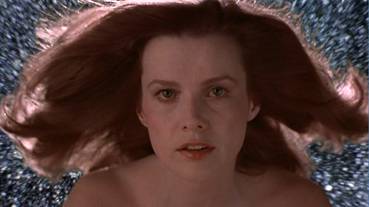
The dialogue comes thick and fast and is delivered with absolute conviction by a superb cast (more on that in a minute), who appear to utterly believe every line they are asked to deliver. There's not a wasted word here, with fully rounded characters shaped in a matter of minutes and back story information evolving as the plot moves forward, which it does in sometimes surprising leaps: Eddie and Ellen agree to marry and the next scene has them on the brink of divorce seven years later. We don't need to see the process that bought them there, it will all become clear in the next five minutes of character interaction. The narrative drives the film and we engage with the characters not through some artificially staged scenes of family life, but because the are so INTERESTING.
Which brings me back to the performances. One presumes the casting was at least partly down to Russell (you never know with Hollywood films), but whoever made the final decisions here deserves the biggest pat on the back you can hand out. Previously a stage actor with only TV bit part experience, William Hurt is nothing short of dynamic as Jessup, an obsessive ball of energy who is never less than compelling to watch and fires out his lines like his life depends on everyone believing in what he is trying to do. I can't think of many actors who could so successfully sell the scene in which all we hear is Jessup's voice describing his experiences as a primitive hunter. When he says "I'm killing the goat..." you can almost visualise the experience (and it is so much to Russell's credit that he, as a film-maker, does not), and the ferocious physicality of his attempts to communicate with Arthur and Mason after he emerges from the tank unable to speak make for electrifying drama. If you only know Hurt as the notable supporting actor he appears to have become of late, you owe it to yourself to see just how great a lead he once was (oh, and check him out in Lawrence Kasdan's Body Heat as well, while you're at it).
Hovering quietly in the background as the dutiful Arthur is the too often underused Bob Balaban, a master of doing a lot while seeming to do little, which is counterbalanced very nicely by Charles Haid's sometimes explosive anger and indignation as the furiously sceptical Mason. Completing the quartet is Blair Brown, whose delivery of the more emotional material is heartbreaking real, never more so than in a scene close to the end in which her explanation to Mason of her feelings for Eddie almost – but not quite – collapses into tears of despair.
This combination of script, direction and performance not only makes for gripping drama, but allows Russell to move us into the realms of the fantastic without betraying the underlying reality. As Jessup's experiences intensify and what was once confined to the mind is externalised in physical and eventually metaphysical terms, there is no point at which the journey becomes unbelievable, at least in terms of the film's narrative, not least because they are always backed by what sounds like convincing scientific reasoning. The result is that when we do move into the realms of the improbable it still feels right because it builds so effectively on what we have previously and successfully bought as real.
Make no mistake, this may start out as scientific drama but it is a science fiction fantasy, something Russell signifies early on through the visualisation of Jessup's more abstract trips and memories. It is these that, in the cinema at least, give the film a substantial part of its head-busting kick. An extraordinary combination of the religious, the sacrilegious, the surrealist, the symbolic and the abstract, they are an audio-visual sensual assault, but still rooted in Jessup's personal history and state of mind.
Now there are going to be some viewers, raised as they are on the steely technical perfection of CGI, who get sniffy at the effects here, a combination of optical processing, physical make-up (courtesy of Dick Smith) and dream-like photographic compositions (Blade Runner's cinematographer Jordan Cronenweth). But with CGI there is always the temptation to let the technology lead, over-complicate the imagery purely because you can, an especially dangerous temptation when dealing with drug trip imagery. Hell, sit me down with After Effects for a couple of hours and I'll give you a sequence that will certainly look trippy, but it will also be random and formless, accusations that absolutely cannot be levelled at Altered States
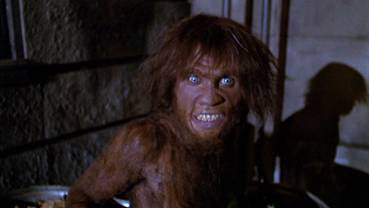
The timing of the moments in which the scientific and dramatic antes are substantially upped are close to sublime and Russell here proves beyond doubt that given the right material he can direct seven bells of shit out of the competition. For a filmmaker often mislabelled for his excesses, it's his restraint here that is key to much of what makes the film work so well. There is no showy camera placement or look-at-me editing – Russell's direction always serves the story and the performances, upping the pace when the sequence demands it and flexing his creative muscles only when Jessup's visions demand he do likewise. The acid test here has to be Jessup's physical regression to primal man, assaulting a security guard, escaping the lab, running from wild dogs and killing a deer at the zoo to feed on. On paper it should tip the film over into silliness, but it absolutely doesn't. Russell plays the scene straight and again scores a casting coup with Miguel Godreau, who brings a raw but acrobatic physicality to the role that makes even this potentially implausible narrative leap seem completely believable. What could and in other hands would provoke laughter is in Russell's hands a thrillingly staged sequence – when I saw this in the cinema there was not a hint of mockery on the part the audience. They were hooked. And once you buy into this, then the final move into full-blown fantasy, where primal memory is externalised and physical matter is transformed into energy, just seems a logical last step. That it is so vividly, imaginatively realised, provides the film with a mother of climax, and for the second time (the first is a stunningly executed sequence in which Jessup trips out with Hichi Indians) allows Russell and his team to really show their hallucinogenic metal.
There are major spoilers ahead. If you haven't seen
the film yet I'd click here. |
Which brings us to the one area that seems to divide opinion even amongst the film's fans – the ending. If you haven't seen the film and you ignored the spoiler warning above and kept reading, then do yourself a favour and stop doing so now. Go see the film, see what you make of it then come back and we'll talk.
The problem many have had with the ending is that it's not only too simple, especially after all that has gone before, but too Hollywood. Jessup does battle with the bad guy, in this case his own mind and body, and defeats it to get the girl. A battle with infinity ends with a simple declaration of love. The end. Is that it? Well, yes and no. The journey to this moment has not been an easy one either for Jessup or Emily. For Jessup the concept of love has been exactly that, a theoretical notion that arises from desire, need and familiarity, and one he has been unable to properly feel or express. This is most keenly felt in his agreement to marry Ellen. There is no declaration of love here, more a matter-of-fact summing-up of his feelings:
"All right, we'll get married since its that important to you. I'm not comfortable with women and I'm not likely to find anyone HALF as remarkable as you again. I think I can make a reasonably good husband. I don't want to lose you, you see."
Emily responds with some resignation: "I suppose that's the closest thing to a declaration of love I will ever get out of you." This telegraphs the narrative importance of Jessup's final declaration. He goes searching for the Ultimate Truth, a spiritual realisation, and finds nothing, and yet in the end finds spiritual salvation not through religion or metaphysics, but in earthbound emotional realisation. Here love really does conquer all. And yet...
It is perfectly possible to read this in negative terms, not so much in Jessup's actions within the narrative as in the decision to bring him to this point. As a scientist, Jessup is reckless and self-absorbed, but he is nonetheless pushing boundaries beyond even that expected of great scientific minds. There is here the suggestion that there is only so far any of us should go before we should turn back, as if there are things that man was simply not meant to know, a science-based version of the old argument thrown against the likes of Dr. Frankenstein for attempting to play God. In that context the ending has Jessup realise this and ultimately abandon science for emotion. It appears logical within the context of the film because his science is set to ultimately destroy him, whereas his emotions have the power to free him, but in generic terms this is all too familiar. Science here is dangerous and the pursuit of it self-destructive, something science fiction movies have been telling us since the medium was born, and in literature long before that. It is, of course, a tad ironic that film-makers use equipment and materials that science helped to create to tell us that this very same science is a bad thing. And yet...
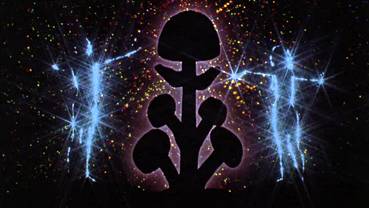
Tipping the argument back in the film's favour is the drug addiction sub-story that runs through the narrative, blatantly in Jessup's ingestion of increasingly dangerous chemicals and disregard for those close to him or his own safety, more metaphorically in the resulting regression from man to beast and the final emergence from near-fatal cold turkey, freed of his dependence and once again functioning as a human being.
But then swinging things back the other way a tad, and probably the main cause of complaint, is the abruptness of this conclusion – a declaration of love, a smile from Emily, fade to black. Even for someone who had adored what had gone before, I found it hard to completely ignore the little voice inside me that was whispering "Is that it?"
Whichever version you go for, though, there is no way you can convincingly write off the ending as a simple conformity to conventional narrative theory and mainstream audience expectation. It certainly resonated with some – this entire final sequence was lifted almost shot for shot by director Steve Barron in 1985 for his award-winning video for A-Ha's Take on Me, while the film's rejection of the concept of a spiritual truth prompted a similarly structured but semi-religious response in the climax of Douglas Trumbull's 1983 Brainstorm.
But any small niggles I may have with the ending fail to negatively impact on what remains one of the most glorious examples of Outsider cinema made within the studio system. Indeed, this is a film, like David Fincher's Fight Club, that could not have been made any other way, demanding as it does a studio-level budget to properly realise. The miracle is that Russell, like Fincher, was given the space to realise it his way. And yes, it does lose some of its brain-battering impact outside of the cinema, but it's still a brilliantly written, performed and directed example of modern science fiction drama at its electrifying best.
| sound and vision |
Altered States was released on region 1 DVD back in 2004 and I, for one, fully expected the region 2 to shortly follow. Well it's taken its time but is finally here, though just why it's taken almost two years to do so is anybody's guess. Probably the most disappointing aspect of this delay is that Warner have not used the intervening years to improve on that release in any way. But it's also no worse, and in picture and sound terms this is no bad thing.
Framed 1.78:1 and anamorphically enhanced, the picture here is for the most part first rate, with colour, detail and contrast all very pleasing. There is a degree of noticeable grain during some of the effects shots, but this is pre-CGI matte work and sometimes par for the course. There are a fair few dust spots here and there, but otherwise this is a very good transfer.
The 5.1 soundtrack may not be as lively as some or as explosive as the film deserves, but there is some good separation work during the trip sequences or in the presentation of John Corigliano's superb score, and the LFE and surrounds really kick in with Jessup's vividly realised Dante-like visions of Hell. In the absence of a new DTS mix, this will do fine.
| extra features |
Not a sodding thing. This is where the disc is most lacking, and there's so much scope here, starting with a Ken Russell commentary, a documentary on the production, interviews with the actors (especially Hurt), and maybe even a little info on the rift between Russell and Chayefsky. And that's just for starters. Oh well, dream on. There's not even a trailer.
| summary |
Altered States is one of those rare films that completely unites the Outsider crew – we all adore it, and two of us still treasure memories of what it did to us in the cinema, something there's tragically little chance of repeating. It's a bloody shame that Warner have not seen fit to give more than just a bare bones disc here, and the transfer could do with those dust spots removed and cries out for a stonking DTS remix. But for the film itself, which is otherwise very well presented, the disc comes recommended.
* Russell himself provided a detail explanation when we got the chance to talk to him about the film, which you can read here.

